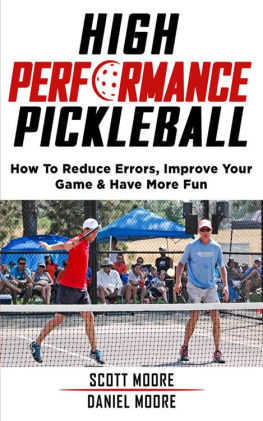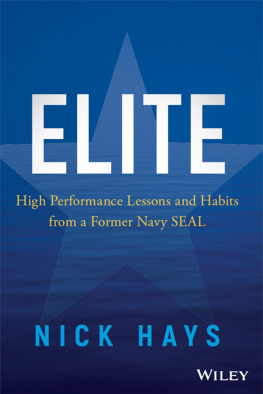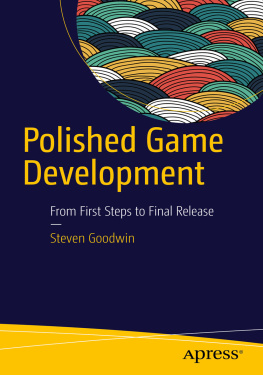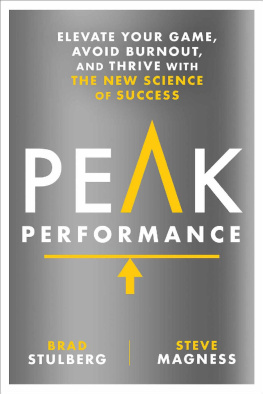
Copyright 2019 by Alan Stein Jr.
Cover design by name Jody Waldrup.
Cover copyright 2019 by Hachette Book Group, Inc.
Hachette Book Group supports the right to free expression and the value of copyright. The purpose of copyright is to encourage writers and artists to produce the creative works that enrich our culture.
The scanning, uploading, and distribution of this book without permission is a theft of the authors intellectual property. If you would like permission to use material from the book (other than for review purposes), please contact permissions@hbgusa.com. Thank you for your support of the authors rights.
Center Street
Hachette Book Group
1290 Avenue of the Americas, New York, NY 10104
centerstreet.com
twitter.com/centerstreet
First edition: January 2019
Center Street is a division of Hachette Book Group, Inc. The Center Street name and logo are trademarks of Hachette Book Group, Inc.
The publisher is not responsible for websites (or their content) that are not owned by the publisher.
The Hachette Speakers Bureau provides a wide range of authors for speaking events. To find out more, go to www.HachetteSpeakersBureau.com or call (866) 376-6591.
Library of Congress Cataloging-in-Publication Data
Names: Stein, Alan, Jr., author. | Sternfeld, Jon, author.
Title: Raise your game : high performance secrets from the best of the best / Alan Stein Jr., with Jon Sternfeld ; foreword by Jay Bilas.
Description: First edition. | New York : Center Street, [2019] | Includes bibliographical references.
Identifiers: LCCN 2018034534| ISBN 9781546082866 (hardcover) | ISBN 9781549171345 (audio download) | ISBN 9781546082873 (ebook)
Subjects: LCSH: Success in business. | Success. | Performance.
Classification: LCC HF5386 .S8559 2019 | DDC 650.1dc23
LC record available at https://lccn.loc.gov/2018034534
ISBNs: 978-1-5460-8286-6 (hardcover), 978-1-5460-8287-3 (ebook)
E3-20181113-JV-NF-ORI
CONTENTS
Luke, Jack, and Lyla I love you more than words can express.You inspire me to raise my game.
I first met Alan Stein Jr. at a Skills Academy for high school basketball players. It was essentially a camp for many of the best prospects in the country, players who would soon populate the NBA draft and be some of the biggest names in the game. Alan was introduced to me as an expert in athletic performance training. I soon learned he was much more than that.
From the very beginning of the Skills Academy, Alan was never on time. He was always early. He didnt speak in meetings unless he had something important to say. He listened intently and took notes purposefully. He was always available, and no task at the camp was too small for him. He was, to use a term that has become almost clich, a servant-leader. In my view, however, Alan was something more valuable. He was a great teammate. He did his job and helped others do theirs.
To me, that is an important aspect of Alans character. He has ambition to move up and succeed, just as any motivated person would, but, rather than concentrate on networking, Alan was resolute to do the job in front of him and look for any way to add value to the jobs being performed by others. If a player was in the gym early, Alan rebounded for that player. If someone was needed to jump into a drill, Alan was right there to do it. If there was something on the floor, Alan picked it up. If the floor had not been swept from the day prior, Alan swept it.
It was not done to impress; it was done because it was needed. But, it did impress. It impressed everyone. General Martin Dempsey, former chairman of the Joint Chiefs of Staff, once said that leadership is a journey, not a destination. If you ever think you have it right and have nothing else to learn about leadership, Dempsey continued, you are making a serious mistake. To me, Alan embodies General Dempseys three key principles of leadership: character, competence, and humility. Alan is a man of great character, a man with a moral firmness that does not bend to any prevailing wind. He is an expert in his field and continues to study and learn as the game and technology change. And, Alan is humble enough to listen, learn, and work as if he is dirt poor.
Alan has risen in his field and is held in such high esteem by the best players and coaches in the game because of the consistent excellence in the performance of his job, and because he is constantly getting better and making his team better. Alan brings positive energy to everything he does, the positive energy that comes not from cheerleading but from the inspiration of doing hard things well. Alan does those hard things, and others join in willingly because of the example he sets.
An example of his example: several years ago, I started a basketball camp in Charlotte, North Carolina, for high school players who wish to get better and young coaches who wish to develop their skills. I believe I started this camp and continue it every year for the right reason: to give back and help others the way that so many helped me along the way. When the camp started, it was low budget and fledgling, and I mentioned it to Alan. Immediately, he said he would be there to work the camp. Frankly, the camp was far below Alans level. Yet he was there from the first coaches meeting to the last moment any player was on the floor. He was, literally, the first person in the gym and the last person to leave.
Although Alan would shrug this off, the example he sets for these young high school players is invaluable. And the role model he is for young coaches is unmatched. Alan brings a technical expertise to the camp that few camps around the country can match. But he brings an inspirational presence that no camp anywhere can match. That is how important he is.
Both Alan and I are products of team sports, and I believe we both understand and value how the lessons and principles we learned in team sports can be applied and used in academics, business, and countless other pursuits. For many reasons the principles that make one successful in team sports resonate with people and reach them on a different level, one that lessons from other endeavors seemingly cannot.
In basketball, my team always had an opponent. We had a talented, athletic, and unified group of players actively and physically trying to stop us from executing the actions we intended to take. In school and business, I may have had competitors, but I never had an opponent.
Never once in my career as a lawyer or broadcaster did anyone actively try to stop me from executing the actions I intended to take. The only one that could stop me was me. This book will help you get out of your own way and free you up to achieve without fear of failure. It wont motivate you, because you dont need motivation. It will inspire you.
I have spent the last twenty-six years as both a lawyer and a broadcaster. I can confidently state that I have not worked a single day without consciously using the lessons I learned from a coach or a teammate I have been around or from the books I have read in my field. This book will provide you with those lessons and principles of success that translate across boundaries of sport and business.
I am so pleased that Alan has written this book. He has learned from the best, and as a result, he is the best. And I am profoundly lucky to have him as a friend.
Jay Bilas ESPN
In 2013, USA Basketball invited me out to Las Vegas to work at a camp alongside some of the best college coaches in the world, giants like the University of Kentuckys John Calipari, the University of Floridas Billy Donovan, and Gonzaga Universitys Mark Few. The first day was dominated by shooting drills and scrimmages before the coaches conducted a formal draft, led by CBSs Bill Raftery and ESPNs P. J. Carlesimo, to select the teams. But as I looked out onto the court, I wasnt watching college stars or future NBA prospects. No, the players were all middle-aged men with lots of disposable income, a willingness to hustle, and an undying love of basketball. USAB was getting into the sports fantasy camp business, a booming industry. Incredibly successful men will pay serious money to run up and down the court for hours, shoot hoops, and get yelled at from the sidelines by their heroes. Thats their dream.
Next page






